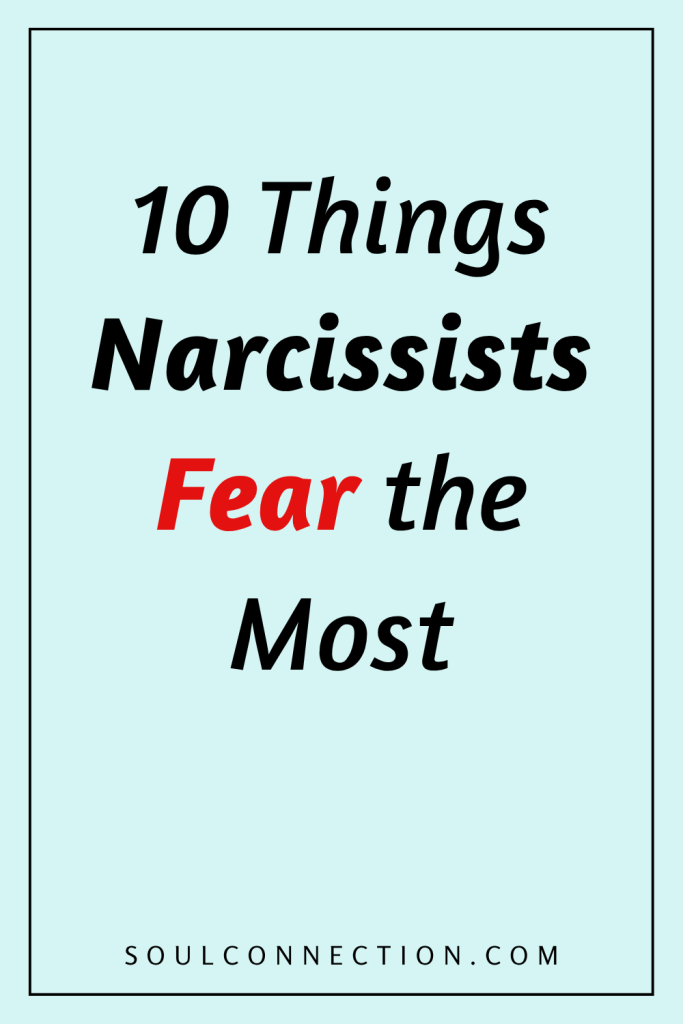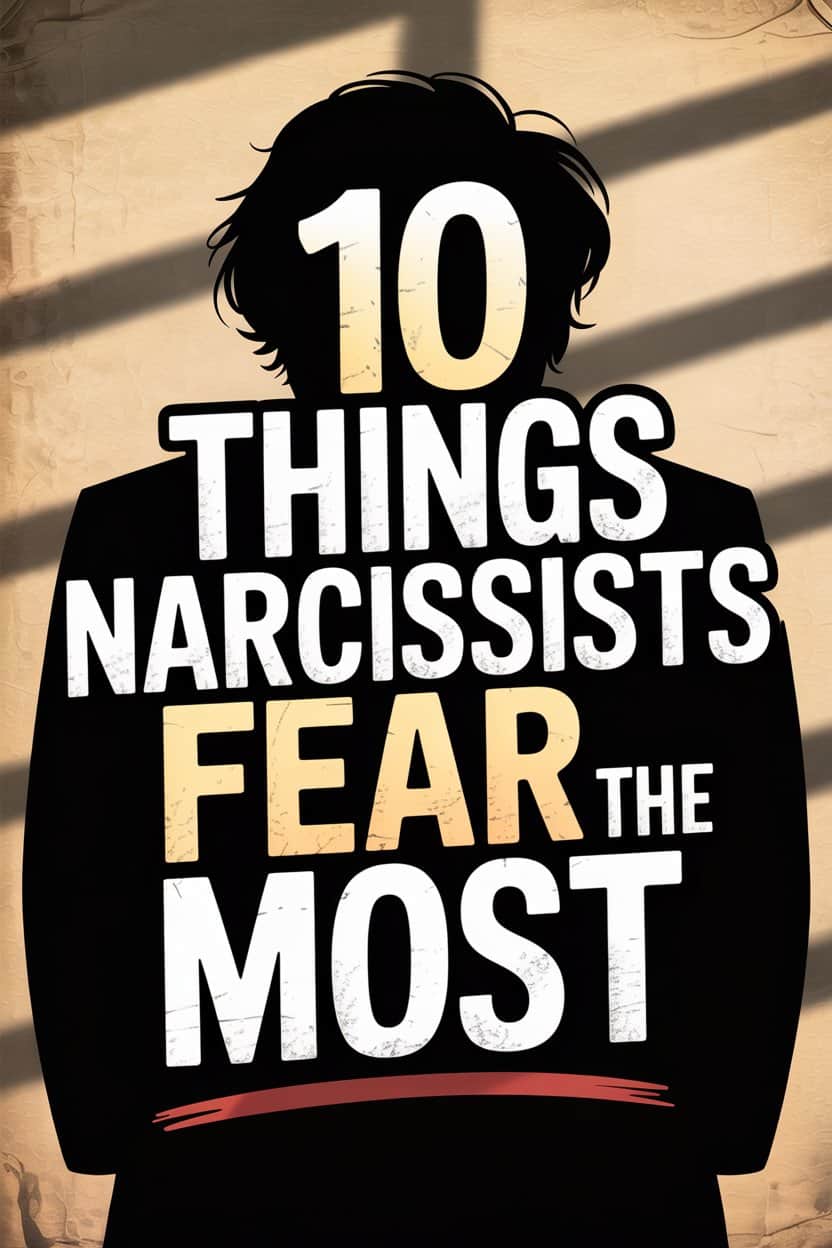Ever tried poking a bear with a stick? That’s child’s play compared to uncovering what really terrifies a narcissist.
Sure, narcissists swagger around like the world owes them a standing ovation, but under all that bravado, there’s a trembling jelly of very specific fears.
While most of us worry about things like bills, our mother-in-law’s next visit, or which group chat we just posted in, narcissists are haunted by an entirely different set of bogeymen.
Here are the ten things that send chills down the spine of someone who’s absolutely convinced they should be on a postage stamp. Let’s peel back the curtain.
1. Criticism That Sticks
Ever watched a cat pretend it didn’t just fall off the couch? That’s a narcissist after getting constructive feedback. Criticism, even of the garden-variety “Hey, maybe don’t microwave foil” kind, is kryptonite.
But it’s not just any critique—what really sends them into a spiral is feedback that’s logical, fair, and impossible to dismiss.
Narcissists spend a lifetime constructing a bulletproof self-image. A well-aimed comment (especially in front of witnesses) can poke a hole in that armor.
Expect defensiveness, blame-shifting, and possibly the invention of several new conspiracy theories about why you’re out to get them.
If you need to give feedback to someone who radiates narcissistic energy, keep it brief, factual, and as drama-free as a bus timetable.
You won’t change their worldview overnight, but you might avoid a three-hour monologue about their tragic childhood.
2. Real or Imagined Rejection
The only thing worse to a narcissist than being criticized is being ignored. The horror! Narcissists thrive on attention—think solar panels, except the sun is you and your constant validation.
Actual rejection (getting dumped, not picked for a project, or being left on read) is their worst nightmare. But even the hint of being left out or sidelined can set off alarm bells.
You might notice a sudden ramp-up in attention-seeking—or a cold, calculated silent treatment designed to make you grovel.
If you need a little peace and quiet in your life, start appreciating the joys of not responding instantly. Just don’t be surprised if your phone starts blowing up with “subtle” reminders of their existence.
3. Exposure of Their Flaws
Narcissists hate a spotlight — unless they’re the one controlling it. Drawing attention to their inconsistencies, mistakes, or less-than-perfect moments is like pulling back the curtain on the Wizard of Oz.
Suddenly, all that smoke and thunder looks a lot less impressive.
This fear of exposure can make narcissists expert blame-shifters. If something goes wrong, it’s never their fault. Instead, they’ll twist the narrative until they’re the misunderstood hero and you’re the villain. (Bonus points if they can make you believe it.)
Dealing with this dynamic? Keep your own reality checks handy, and don’t get sucked into rewriting history.
4. Losing Control of the Narrative
Narcissists tell stories the way toddlers decorate walls—messy, colorful, and not entirely based in reality. Control over “the story” is everything. The second they sense they’re losing grip on how others see them, panic mode sets in.
This isn’t about healthy communication or mutual understanding. It’s about keeping the myth intact: they’re always the good guy, and you’re lucky they let you bask in the glow of their presence.
Notice someone rewriting events on the fly? Clock it, but don’t waste your breath arguing. Facts are less important than the story they’re selling themselves (and everyone else).
5. Genuine Intimacy
Underneath it all, narcissists crave adoration, but genuine closeness? That can feel a bit like standing naked in Times Square. True intimacy requires vulnerability and self-reflection, which is about as appealing to a narcissist as a cold shower in January.
Getting close threatens the grand illusion. What if someone sees the cracks? What if someone discovers they’re not as put-together, wise, or invincible as they pretend?
If you’re hoping for more emotional openness from a narcissistic partner, prepare for a long, winding road—possibly filled with detours, scenic routes, and “accidentally” missed exits.
6. Being Outshone
Most people love having talented friends—narcissists, not so much. Someone else’s accomplishments, especially if they’re in the same field or social circle, aren’t just a cause for envy. They’re a five-alarm fire.
Narcissists feel safest at the top of the heap. When someone else starts to attract attention, get praise, or—heaven forbid—steal the spotlight, expect some fireworks.
Maybe it’s subtle undermining, maybe it’s open sabotage, maybe it’s a mysterious wave of “constructive feedback” that’s anything but.
If you’re in the orbit of a narcissist, shine anyway. Life’s too short to dim your light for someone else’s ego.
7. Accountability
The mere suggestion they might need to apologize? Terrifying. Narcissists will leap through flaming hoops to avoid taking responsibility. After all, if they admit fault, the House of Cards they’ve spent years building could come tumbling down.
Watch for the classic moves: deflection (“You’re too sensitive”), minimization (“It wasn’t that bad”), or going on the offense (“What about that time you…”). Accountability is a four-letter word in their book, right next to “humility” and “compromise.”
Insist on boundaries and keep your expectations realistic—sometimes a dignified exit is healthier than chasing an apology that’s never coming.
8. Being Alone
The self-sufficient, independent act is usually just that—an act. Narcissists rely on a steady stream of people to validate their worth.
Take away the audience, and things start to unravel fast. Solitude leaves them face-to-face with thoughts they’d rather not have.
Being alone is confronting. No one to admire them, no one to blame, no one to cast in the role of adoring sidekick or hapless villain. Just their own reflection—and sometimes not even they can stand that.
If you find yourself wondering why a narcissist can’t be single for longer than a Netflix binge, now you know.
9. Not Being Believed
A narcissist’s worst nightmare? Having their carefully crafted persona questioned. If their accounts of events, feelings, or achievements don’t pass the sniff test, cue the outrage.
Validation isn’t just nice to have; it’s oxygen. The moment someone says, “I don’t think that’s what happened,” panic ensues.
Expect a full-court press to restore their credibility, often at the expense of yours. Gaslighting, charm offensives, wounded-hero routines—you name it.
Standing firm in your own reality is the antidote. Don’t let anyone convince you that up is down and down is up.
10. Losing Their Influence Over You
The ultimate horror: realising they no longer have the power to sway your emotions, decisions, or sense of self-worth. Once someone sees through the mask, the narcissist loses their trump card.
You might notice a desperate attempt to win you back—love-bombing, apologies, sudden interest in your hobbies. If that fails, the tactics might turn sour: criticism, guilt-tripping, even attempts to damage your reputation.
Recognising this fear is crucial. It means you’re regaining control over your own narrative, and nothing rattles a narcissist more.
Breaking the Spell
Spotting these fears can feel like seeing the strings on a puppet show you’ve watched a hundred times. The drama, the theatrics, the endless reruns—suddenly, it all makes sense.
Armed with this knowledge, you’re far less likely to get caught in the game. You can set boundaries, stand your ground, and refuse to play the supporting role in someone else’s one-man show.
Turns out, the real power in the relationship was yours all along.
Never hurts to keep a sense of humour and a strong cup of tea handy. Narcissists might fear exposure, rejection, and losing control—but your peace of mind is worth far more than any standing ovation they could ever muster.


